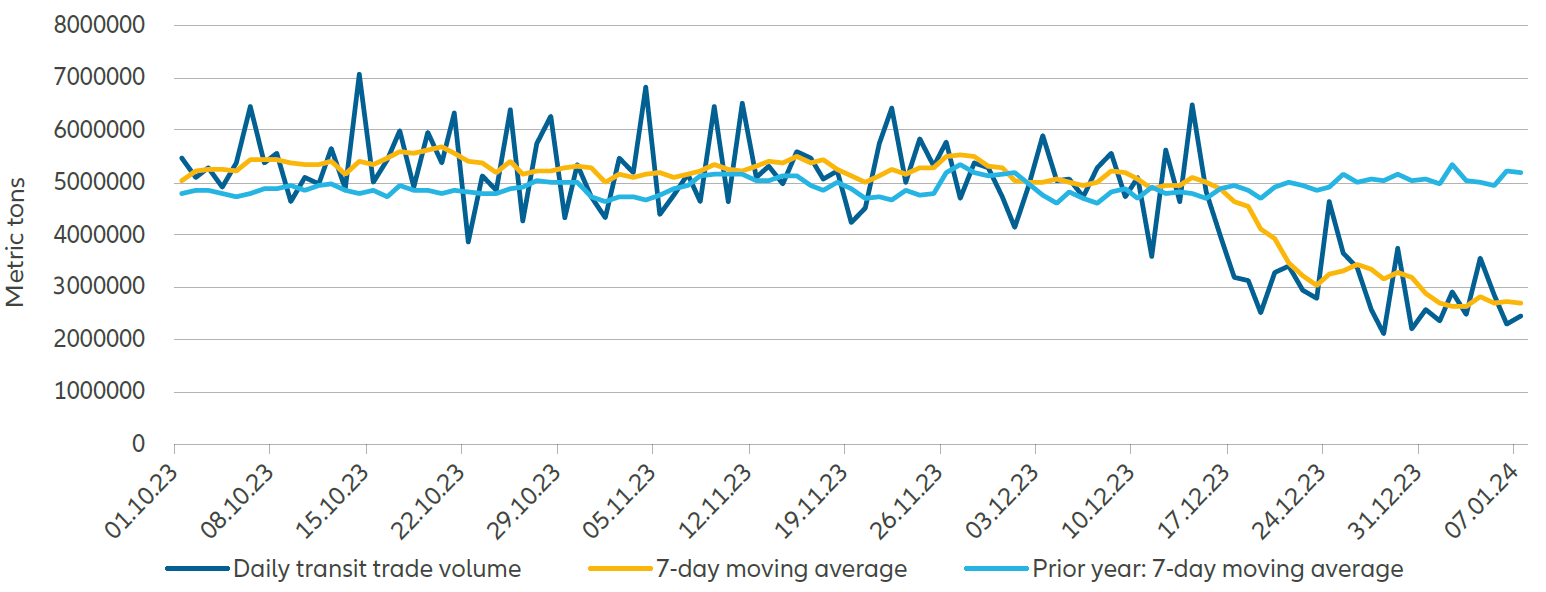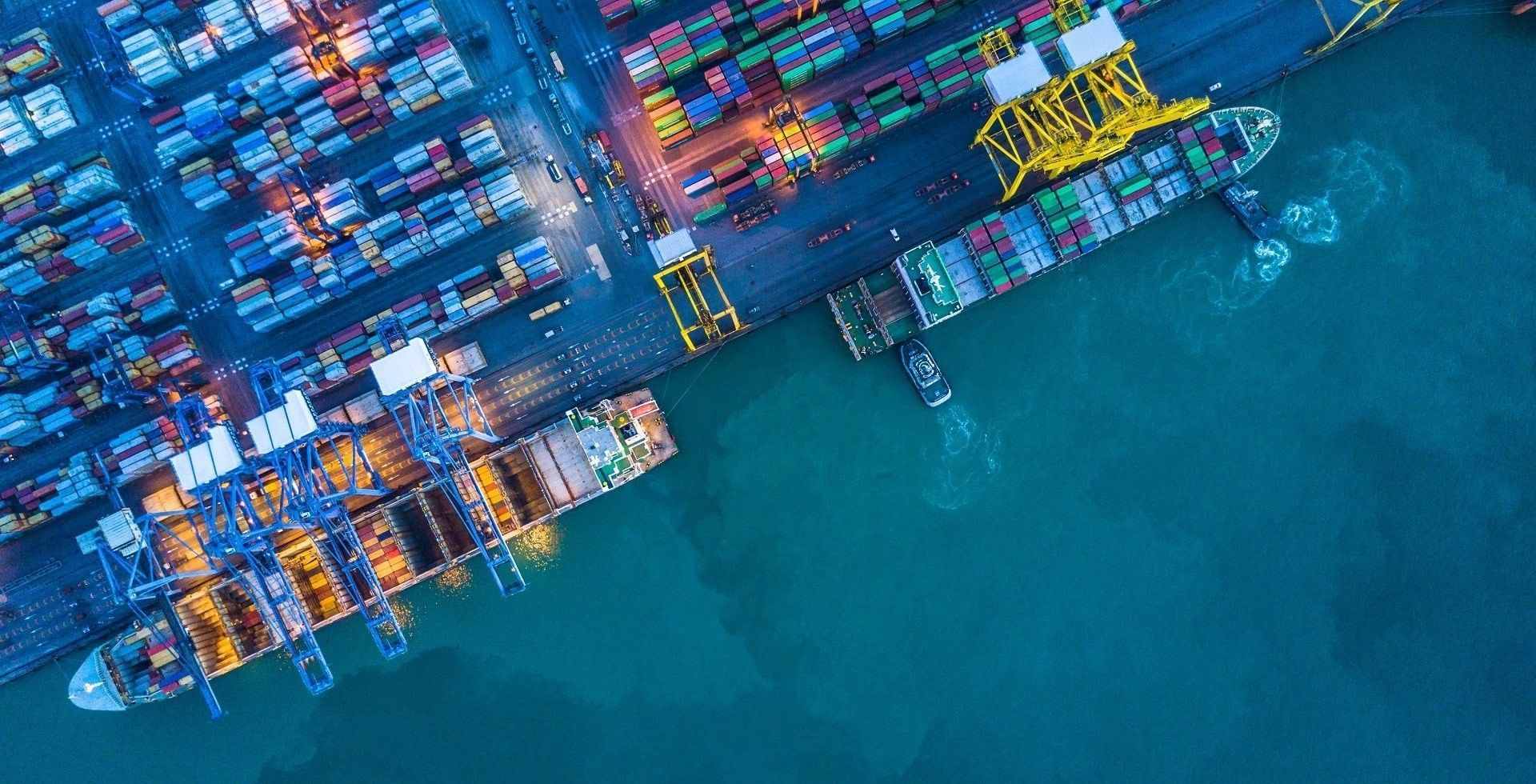Embracing Disruption
Red Sea disruption: impact by sector
Companies are facing the latest supply chain challenge as commercial ships are rerouted from one of the world’s busiest shipping lanes. We see an uneven impact across sectors and think those companies that learned from other recent trade disruptions may be better able to ride out the current upheaval.
Key takeaways
- In the short-term, shipping firms may benefit from the disruption as increased demand for vessels due to longer transport times helps push up container rates.
- Many retailers depend on sea freight for their stock and may be vulnerable to delays, while a greater use of air freight means the technology sector appears largely unscathed.
- We think quality companies that have adapted their operations after other recent supply chain shocks (such as from Covid-19) are likely to be better able to withstand the latest disruption.
Many companies are closely tracking events in the Red Sea as attacks on commercial ships by Houthi rebels in Yemen prompt shipping firms to reroute vessels away from one of the world’s busiest shipping lanes (see Exhibit 1). The attacks, in response to Israel’s war in Gaza, pose a grave threat to global trade – around a third of global container ship cargo flows through the Suez Canal route connecting Europe and Asia. Vessels have been targeted further south on the route as they move through Bab al-Mandab Strait, the narrow channel that divides Africa and the Arabian Peninsula.
Exhibit 1: Daily transit volumes through the Bab al-Mandab Strait have dropped dramatically in recent weeks

Sources: Global Platform; PortWatch. Data as at 7 January 2024.
So far, the disruption has not affected supply chains and companies to the same extent as the Covid-19 pandemic. But continued upheaval may lead to delays in shipments and higher costs for businesses – and ultimately consumers – potentially fanning fresh inflationary pressures.
Our Equities teams see a mixed picture for companies across different sectors:
- Shipping firms: in the short-term, we see a potential boost in profitability for shipping companies. Container rates have risen 61% over the past two weeks, according to the World Container Index.1 Many firms are diverting ships from the Red Sea to the longer alternative route around the Cape of Good Hope at the southern tip of Africa for the foreseeable future – adding approximately 10 days to the journey. The upheaval should help to absorb some of the excess capacity of vessels as longer journey times require more ships. Longer transport times should also help support growth of working capital. But we remain cautious about the outlook for shipping firms. Once hostilities ease, we think container rates will fall and the excess capacity will again prove a challenge. In the short-term, air freight operators may benefit too as companies who would normally have shipped goods by sea seek to ensure swifter delivery for select goods.
- Retailers: many retail firms are on the front line of the disruption. Most rely on the movement of goods from manufacturers in Asia to consumers in the rest of the world, and longer shipping times may lead to delays in getting stock and higher costs. For fashion retailers, freight costs account for around 4% of the cost of goods sold and 2% of sales, according to JPMorgan estimates.2 Delays to maritime trade may prompt some retailers to switch higher-value items to air freight – but that will incur higher costs. A mitigating factor is that existing inventory levels are generally high and many retailers’ freight rates are usually contracted over longer-term periods, so the impact on spot rates may take time to be fully reflected. But if freight rates from Asia to Europe double or triple for a prolonged period, these additional costs will likely erode profit margins.
- Technology and car makers: the impact on the sector will be uneven as most technology items (including semiconductors, smartphones and laptops) are shipped by air rather than sea. Companies reliant on larger items shipped by sea, such as TVs, machinery and vehicles, are more vulnerable. We think car makers may be affected as inventories have come down over recent months. Even before the latest disruption, daily charter rates for transoceanic car carriers had reportedly surged to USD 105,000.3 Only two years ago they were just USD 16,000. Suppliers of semiconductors for the car industry could be affected if shipments of cars are severely disrupted. Elsewhere, technology firms exposed to defence and cybersecurity could benefit in the event of increased conflict in the region.
- Oil and gas companies: energy stocks are positively valued, in our view, given strong balance sheets and free cash flow. Therefore, we are expecting double-digit percentage distributions to shareholders at current oil prices. Such numbers may move higher still if the war in the Middle East escalates. According to the US Energy Information Administration, 12% of total seaborne-traded oil passed through the Bab al-Mandab Strait, the SUMED pipeline (in Egypt) and the Suez Canal in the first half of 2023. The equivalent figure for liquid natural gas was 8%.4 Oil tankers have so far appeared unaffected and oil and fuel tanker traffic in the Red Sea was reportedly stable in December.5 In our view, the biggest catalyst for oil prices – and possibly energy stocks – would come if the rebels turned their focus to the Strait of Hormuz, the narrow stretch of water between Oman and Iran through which around a fifth of the volume of the world's total oil consumption passes every day.6
Conclusion: quality matters
We draw optimism from the lessons many firms have learned in response to recent upheavals to global trade – from the Covid-19 pandemic to the Russia-Ukraine war and US-China trade tensions. We think the Red Sea situation may hasten the regionalisation of some supply chains previously underway. Many firms had already been exploring nearshoring – the process of transferring manufacturing or supplier business to a nearby country closer to the location of demand for its manufactured products. And many more businesses are investing in technology to give them a better overview of their supply chains and management of inventory to avoid delays and shortages caused by disruptions.
We think quality companies that have built more resilience into their operations since the pandemic can ride out the current challenges and better deal with any higher costs – by offering essential products at prices that do not incur a meaningful loss to their market share.
1 Source: Drewry's World Container Index, 4 January 2024
2 Date: as of January 2024.
3 Source: Red Sea Attacks Leave Shipping Companies With Difficult Choices, The New York Times (nytimes.com), 6 January 2024
4 Source: Red Sea chokepoints are critical for international oil and natural gas flows - U.S. Energy Information Administration (EIA), US Energy Information Administration, 4 December 2023
5 Source: Oil tankers continue Red Sea movements despite Houthi attacks, Reuters, 9 January 2024
6 Source: Strait of Hormuz: the world's most important oil artery, Reuters, 20 October 2023
-
Investing involves risk. The value of an investment and the income from it will fluctuate and investors may not get back the principal invested. Past performance is not indicative of future performance. This is a marketing communication. It is for informational purposes only. This document does not constitute investment advice or a recommendation to buy, sell or hold any security and shall not be deemed an offer to sell or a solicitation of an offer to buy any security.
The views and opinions expressed herein, which are subject to change without notice, are those of the issuer or its affiliated companies at the time of publication. Certain data used are derived from various sources believed to be reliable, but the accuracy or completeness of the data is not guaranteed and no liability is assumed for any direct or consequential losses arising from their use. The duplication, publication, extraction or transmission of the contents, irrespective of the form, is not permitted.
This material has not been reviewed by any regulatory authorities. In mainland China, it is for Qualified Domestic Institutional Investors scheme pursuant to applicable rules and regulations and is for information purpose only. This document does not constitute a public offer by virtue of Act Number 26.831 of the Argentine Republic and General Resolution No. 622/2013 of the NSC. This communication's sole purpose is to inform and does not under any circumstance constitute promotion or publicity of Allianz Global Investors products and/or services in Colombia or to Colombian residents pursuant to part 4 of Decree 2555 of 2010. This communication does not in any way aim to directly or indirectly initiate the purchase of a product or the provision of a service offered by Allianz Global Investors. Via reception of this document, each resident in Colombia acknowledges and accepts to have contacted Allianz Global Investors via their own initiative and that the communication under no circumstances does not arise from any promotional or marketing activities carried out by Allianz Global Investors. Colombian residents accept that accessing any type of social network page of Allianz Global Investors is done under their own responsibility and initiative and are aware that they may access specific information on the products and services of Allianz Global Investors. This communication is strictly private and confidential and may not be reproduced, except for the case of explicit permission by Allianz Global Investors. This communication does not constitute a public offer of securities in Colombia pursuant to the public offer regulation set forth in Decree 2555 of 2010. This communication and the information provided herein should not be considered a solicitation or an offer by Allianz Global Investors or its affiliates to provide any financial products in Brazil, Panama, Peru, and Uruguay. In Australia, this material is presented by Allianz Global Investors Asia Pacific Limited (“AllianzGI AP”) and is intended for the use of investment consultants and other institutional /professional investors only, and is not directed to the public or individual retail investors. AllianzGI AP is not licensed to provide financial services to retail clients in Australia. AllianzGI AP is exempt from the requirement to hold an Australian Foreign Financial Service License under the Corporations Act 2001 (Cth) pursuant to ASIC Class Order (CO 03/1103) with respect to the provision of financial services to wholesale clients only. AllianzGI AP is licensed and regulated by Hong Kong Securities and Futures Commission under Hong Kong laws, which differ from Australian laws.
This document is being distributed by the following Allianz Global Investors companies: Allianz Global Investors GmbH, an investment company in Germany, authorized by the German Bundesanstalt für Finanzdienstleistungsaufsicht (BaFin); Allianz Global Investors (Schweiz) AG; Allianz Global Investors UK Limited, authorized and regulated by the Financial Conduct Authority; in HK, by Allianz Global Investors Asia Pacific Ltd., licensed by the Hong Kong Securities and Futures Commission; in Singapore, by Allianz Global Investors Singapore Ltd., regulated by the Monetary Authority of Singapore [Company Registration No. 199907169Z]; in Japan, by Allianz Global Investors Japan Co., Ltd., registered in Japan as a Financial Instruments Business Operator [Registered No. The Director of Kanto Local Finance Bureau (Financial Instruments Business Operator), No. 424], Member of Japan Investment Advisers Association, the Investment Trust Association, Japan and Type II Financial Instruments Firms Association; in Taiwan, by Allianz Global Investors Taiwan Ltd., licensed by Financial Supervisory Commission in Taiwan; and in Indonesia, by PT. Allianz Global Investors Asset Management Indonesia licensed by Indonesia Financial Services Authority (OJK).
3202715














